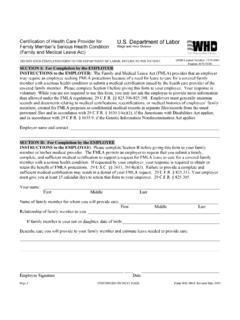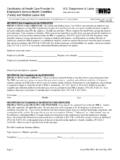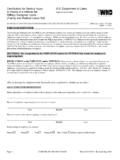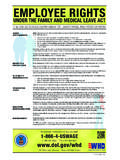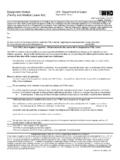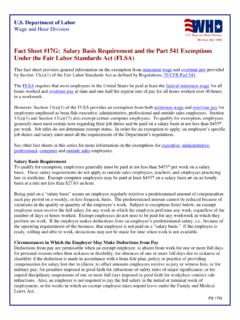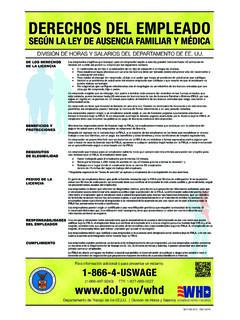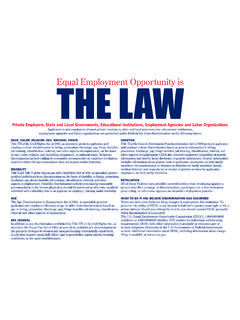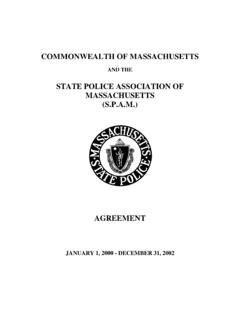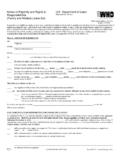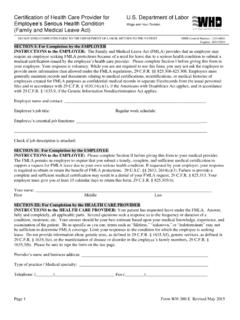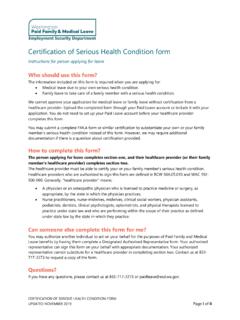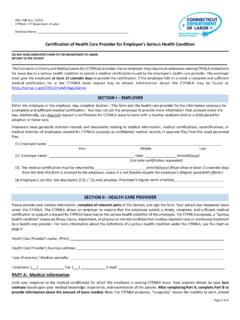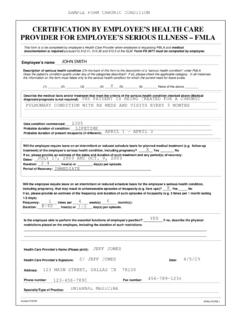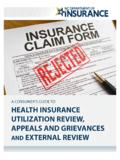Transcription of Fact Sheet #28C: The definition of “parent” as it applies ...
1 Department of Labor Wage and Hour Division (July 2015). Fact Sheet #28C: The definition of parent as it applies to an individual who stood in loco parentis to an employee for FMLA eldercare . protections. The Family and Medical Leave Act (FMLA) entitles an eligible employee to take up to 12 workweeks of job-protected unpaid leave to care for a spouse, son, daughter, or parent with a serious health condition. See 29 USC 2612(a)(1). FMLA leave may be taken to provide care for any individual who is the employee's parent as the term is defined in the statute and its regulations. See 29 USC 2611(7). In enacting the FMLA, Congress recognized the changing nature of the American population, including the growing number of elderly Americans and the growing need for wage earners to provide care both for their children and for their parents. For FMLA leave purposes, a parent is defined broadly as the biological, adoptive, step, or foster parent of an employee or an individual who stood in loco parentis to the employee when the employee was a son or daughter.
2 See 29 Parent does not include the employee's parents-in-law. This Fact Sheet provides guidance on recognizing situations in which an eligible employee may take leave to care for an individual who stood in loco parentis to the employee when the employee was a child. What does in loco parentis mean under FMLA? In loco parentis refers to the type of relationship in which a person has put themselves in the situation of a parent by assuming and discharging the obligations of a parent to a child. It exists when an individual intends to take on the role of a parent. The FMLA regulations define in loco parentis as including persons with day-to-day responsibilities to care for or financially support a child. Courts have indicated some factors that determine in loco parentis status include: the age of the child;. the degree to which the child is dependent on the person.
3 The amount of support, if any, provided; and the extent to which duties commonly associated with parenthood are exercised. An eligible employee is entitled to take FMLA leave to care for a person who provided such care to the employee when the employee was a child. If the individual stood in loco parentis to the employee when the employee was a child, the employee may be entitled to take FMLA leave even if he or she also has a biological, step, foster, or other parent, provided that the in loco parentis relationship existed between the employee and the individual when the employee met the FMLA's definition of a son or daughter.. Although no legal or biological relationship is necessary, grandparents or other relatives, such as siblings, may stand in loco parentis to a child under the FMLA as long as the relative satisfies the in loco parentis requirements.
4 Note that, in all cases, conditions must be evaluated according to the specific facts. FS 28C. Examples of in loco parentis for leave to care for a parent An eligible employee may take leave to care for any individual who stood in loco parentis to the employee when the employee was a child regardless of any biological relationship of the two people. For example: An employee may take leave to care for his aunt with a serious health condition, if the aunt stood in loco parentis to him when he was a son or daughter.. An employee may take leave to care for her grandmother with a serious health condition if the grandmother stood in loco parentis to her when she was a son or daughter.. A son or daughter of a same-sex partnership may take leave to care for the non-adoptive or non- biological partner who stood in loco parentis. Unless an in loco parentis relationship existed when the employee was a son or daughter, an employee is not entitled to take FMLA leave to care for a grandparent or an aunt with a serious health condition.
5 What may be required to document an in loco parentis relationship? The employer's right to documentation of family relationship is the same for an employee who asserts the need to care for an individual who stood in loco parentis to the employee as it is for a biological, adoptive, or other parent. Such documentation is limited to the employee's simple statement asserting the relationship. For an employee seeking leave to care for an individual who stood in loco parentis to the employee, such statement may include, for example, the name of the individual and the statement that this person stood in loco parentis to the employee when the employee was a child. An employee should provide sufficient information to make the employer aware of how the individual in need of care stood in loco parentis to the employee when the employee was a son or daughter.
6 See 29 CFR In loco parentis status and other FMLA requirements In loco parentis status under the FMLA does not change the law's other requirements, such as those regarding coverage, eligibility, and qualifying reasons for leave. All requirements must be met for the FMLA protections to apply. An employee asserting rights to care for a parent who stood in loco parentis to the employee may be required to provide notice of the need for leave and to submit medical certification of a serious health condition consistent with the FMLA regulations. For additional information about the FMLA, visit the Wage and Hour Division Website, and/or call our toll-free helpline, 1-866-4-USWAGE (1-866-487-9243). available 8 to 5 in your time zone. You may also wish to review Administrator Interpretation No. 2010-3 for information specific to the in loco parentis issue.
7 This publication is for general information and is not to be considered in the same light as official statements of position contained in the regulations. 1-866-4-USWAGE. Department of Labor TTY: 1-866-487-9243. Frances Perkins Building Contact Us 200 Constitution Avenue, NW. Washington, DC 20210. -2.
